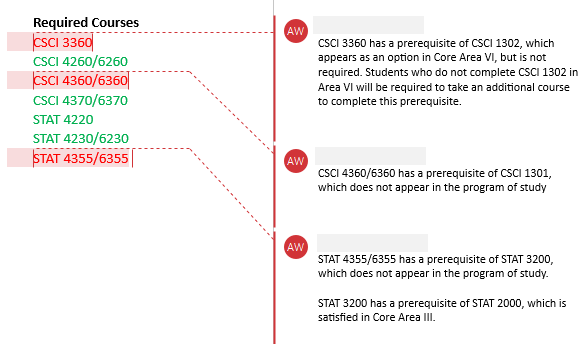PARC Reports and Data
During the Office of the Registrar’s analysis of program requirements, many factors contributing to the curriculum being confusing to students, such as hidden prerequisites, course substitutions, and underused courses were uncovered.
“Hidden” prerequisites:
- Courses that are not part of a program of study but are necessary in order to take required courses.
- Require students to take extra courses
- Do not satisfy major requirements
- Often delay time to graduation.
The Office of the Registrar reviewed all undergraduate majors to determine if there
were any hidden prerequisites. A copy of each undergraduate program with the following
notations was attached to the program in PARC so the department can determine how
to update the program of study.
- Green text indicates the course either does not have any prerequisite courses OR that the prerequisite(s) are already built into the program of study.
- Red text indicated the course has hidden prerequisites.
- Comments outline the prerequisite issues.

DegreeWorks Data Reports
The Registrar’s Office worked with the Office of Institutional Research to create reports of DegreeWorks data in Tableau to support the curriculum revision process. These reports are available to help units better understand the course substitutions and exceptions that students are using towards undergraduate major and minor requirements, and to help units understand where and how their courses are being used. Units should access these reports and use the data as an aid in their analysis of their curriculum.
Exceptions Details Report:
- There are two versions of the Exceptions Details report, (1) one for majors and (2)
one for minors:
- The version of the report for majors displays the number of exceptions by undergraduate major program and by DegreeWorks requirement.
- The version of the report for minors displays the number of exceptions by minor program and by DegreeWorks requirement.
- This data may be used by departments to better understand the impacts of making exceptions and how updating their curriculum can be a benefit to the students, faculty, and staff within their departments.

The Exceptions Details Reports are available on the Office of Institutional Research
website, under Operational Reports, at: https://oir.uga.edu/data/oper/studentcourse/
DegreeWorks Report: Exceptions By Major
DegreeWorks Report: Exceptions By Minor
Note: To access and view the reports, you must be connected to the UGA network via wired or wireless connection or connected via the UGA campus remote VPN.
Course Usage Report:
- There are two versions of the Course Usage report, (1) one for majors and (2) one for minors.
- There are two tabs in each version of the report:
- Tab 1 (Course Usage) includes the courses that students are using to satisfy requirements in their undergraduate major or minor.
- Tab 2 (Courses Applied Details) includes the details of how a specific course is being used to satisfy requirements in the major or minor and how the course is being applied to other requirements university-wide.
- These reports can be used to determine the need for courses, such as:
- If courses exist but are being not used often, the department should consider allocating those resources to other courses.
- If there are a large number of students taking certain courses, departments may determine that there is a need for additional sections of these courses.
- If the course appears in a larger number of majors, deleting the course could have a negative impact on student completing their degree on time.

The Course Usage Reports are available on the Office of Institutional Research website,
under Operational Reports, at: https://oir.uga.edu/data/oper/studentcourse/
DegreeWorks Report: Course Usage by Major
DegreeWorks Report: Course Usage by Minor
Note: To access and view the reports, you must be connected to the UGA network via wired
or wireless connection or connected via the UGA campus remote VPN.
